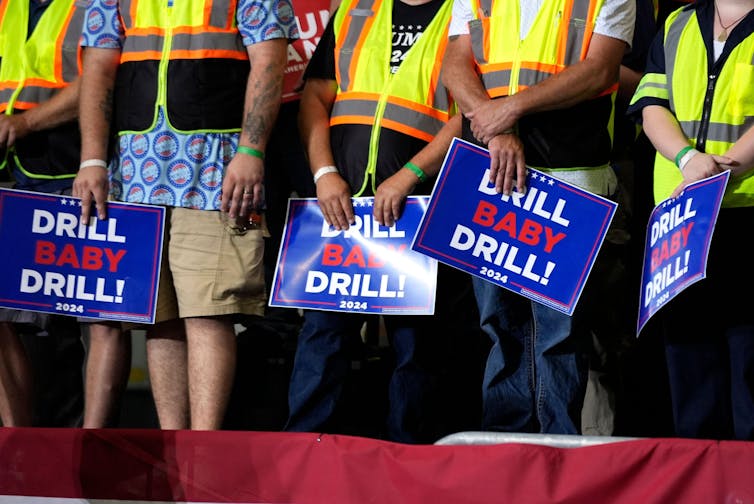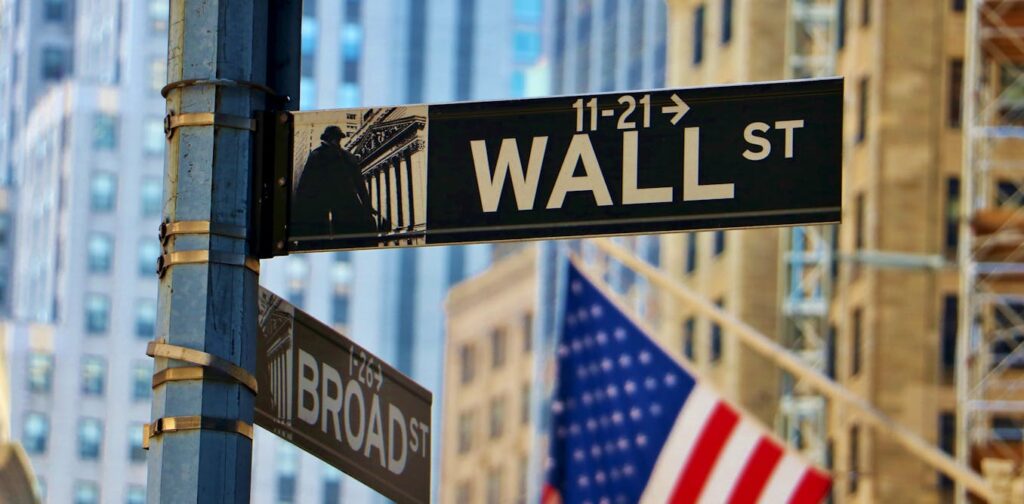After Donald Trump’s victory in the US presidential election, Bitcoin was one of the assets that soared in value. This was widely seen as a response to Trump’s promise to establish a strategic Bitcoin reserve – essentially holding a large stockpile of the cryptocurrency as security. On November 13, the week after Trump’s victory, Bitcoin crossed the US$90,000 (£71,340) price threshold for the first time, and the value of the global crypto market surpassed $3 trillion of US dollars for the first time in three years.
US stock markets, the Dow Jones, S&P 500 and Nasdaq, also hit record highs as investors expected to price in Trump’s promises of tax cuts and tariffs, boosting the dollar and triggering a sell-off in US government bonds. Promises of corporate tax cuts and deregulation tend to encourage financial innovation, making markets more active.
These and others can be defined as “Trump trades” – financial market trends influenced by the president-elect’s victory. These trends are emerging as investors adjust their strategies based on economic policies, regulatory changes and geopolitical impact associated with the Trump presidency.
When Trump last became president in 2017, prices of consumer goods had risen nearly 5% over the previous four years. On the other hand, since January 2021, these same prices have increased by around 20%. This is a radically different economic context in which inflation has been a global phenomenon since the start of the COVID pandemic in 2020.
Supply chain issues, changing consumer habits, cost of living, and other quirks of COVID lockdowns have collided with the American Rescue Plan Act of 2021 (a government relief plan). $1.9 trillion aimed at supporting workers during the pandemic) to drive up costs.
This combination of inflation and higher interest rates could make many of the ideas Trump has floated riskier or more expensive than before, especially since unemployment is very low. When more people are employed, increased consumer demand can lead to higher prices amid competition for goods and services.
But the markets are currently in euphoria territory. The word speculator comes from the Latin “speculum”, which means mirror. Therefore, investors and speculators in the US capital market today are only mirroring Trump’s promises of economic growth and protectionism.
Trump is definitely pro-market and pro-economy – which creates short-term increases in stock values. But stocks will only stay high if Trump takes a light-touch approach to regulation to roll back some of the reforms undertaken by President Biden’s administration.
Since 2021, the regulatory burden facing the financial sector has increased. Agencies such as the Securities and Exchange Commission and the Consumer Financial Protection Bureau have launched crackdowns on financial companies to protect consumers from bad practices. This has called things like private equity deals and cryptocurrency deals into question.
Read more: Spacs: why investors fell in love with these stock vehicles – and how the bubble burst
Trump’s unpredictability and controversial nature may seem like red flags to investors. Yet markets often take a pragmatic approach, focusing more on outcomes than personal characteristics. For example, Trump’s potential trade war with China could trigger market volatility. But investors will adapt because they see the tariffs as part of a broader strategy to secure better terms for U.S. businesses.
On the other hand, even if markets become volatile or fall (as happened with the US bond market following Trump’s victory), investors could still see a profit opportunity. Active traders often thrive on sharp market movements, and many investors sell their long-term Treasury bonds before any further rise in long-term rates (bond prices fall as interest rates rise).
Impact on EU and UK
Trump’s re-election could have significant implications for both the UK and the EU, notably affecting trade, geopolitics and global economic stability.
Trump’s “America First” policy could pose challenges for the UK and EU in their trade relations. The EU could face tariffs, particularly on sectors like car manufacturing. This protectionist approach could disrupt European exports and global trade flows.
And the United Kingdom, which is hoping for a trade deal with the United States after Brexit, could find itself in a weaker negotiating position under a Trump administration that emphasizes American dominance.
Under Biden, the United States has collaborated with the EU on green energy and technology policies. A Trump presidency, with its rollback of environmental regulations and skepticism of international agreements, could undermine these efforts.

Alex Brandon/Associated Press/Alamy Stock Photo
For Europe, it could mean losing a key ally in global climate initiatives, forcing the bloc to recalibrate its strategies to combat climate change and advance technology. It could also exacerbate tensions around tech regulation, particularly if Trump’s policies align with figures like Tesla boss and Trump’s new efficiency chief Elon Musk, who often clash with EU regulatory frameworks. In this sense, Musk can be considered a financial risk factor.
Under the Trump administration, the combination of tariffs, climate policy rollbacks and geopolitical dynamics could have significant implications for investors. Tariffs and sanctions often trigger sell-offs in affected sectors, but can create opportunities for speculators, who often anticipate these moves.
For example, in the United States, before Trump’s victory, hedge funds began shorting stocks in the energy and renewable energy sectors. They gained $1.2 billion after their stock values fell sharply amid fears about the end of green energy tax credits.
Despite Trump’s rhetoric, markets are buoyed by uncertainty rather than undermined by it. Uncertainty is, after all, the main source of profit in our Western model of capitalism.
It is also true that markets care about concrete actions and that Trump seems determined to keep his promises. But only time will tell if his economic agenda is just wishful thinking.
Trump has only been president for four years and is in a hurry to advance his economic agenda. It is likely that at least some of his economic policies will have a sugar rush effect and cause markets to rise sharply before their impact fades once rising interest rates slow the economy.




